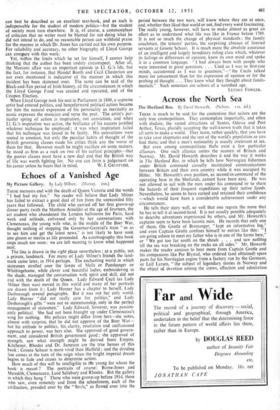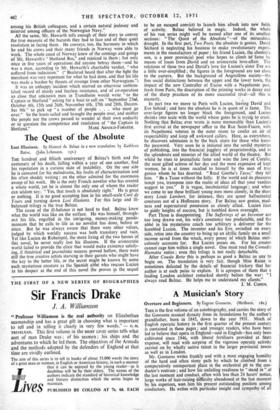Across the North Sea
The Shetland Bus. By David Howarth. (Nelson. 125. 6d.)
• THERE is much to be said for the contention that sailors are the only true cosmopolitans. They contemplate impartially, and often with disdain, the varied attractions of Santos, Odessa and Port Arthur, Texas, placidly accepting the well-known truth that it takes all sorts to make a world. They learn, rather quickly, that you have to take your shipmates and the rest of the world's population as you find them; and that a man's nationality is usually irrelevant at sea. But even among cosmopolitans theie exist a few particular alliances. One such alliance unites the seamen of Britain and Norway. Mr. David Howarth describes it and the way it works in The Shetland Bus, in which he tells how Norwegian fishermen under British command casually maintained communications between Britain and their own country while it was occupied by Hitler. Mr. Howarth's own position, as second-in-command of the operating base in the Shetlands, cannot have been easy. He was not allowed to sail with the men under his command or to share the hazards of their frequent expeditions up their native fjords. Nevertheless, he seems to have earned and retained their confidence —which would have been a considerable achievement under any circumstances.
He tells their story well, so well that one regrets the more that he has to tell it at second-hand. It is not usually possible adequately to describe adventures experienced by others, and Mr. Howarth's captains seem to have been laconic men. He records that only one of them, Ole Grotle of Bremanger, " kept an informative log," and even Captain Grotle confines himself to entries like this: "I am going ashore to meet my father who is in one of the farms here," or " We got too far south on the shoals . . . and saw nothing till the sea was breaking on the rocks on all sides." Mr. Howarth makes the reader anxious to hear more from Captain Grotle and his companions like Per Blystad, who ordered (and obtained) spare parts for his Norviegian engine from a factory run by the Germans, or Leif Larsen, " the subject of legendary stories in Norway and the object of devotion among the crews, affection and admiration
among his British colleagues, and a certain natural jealousy and mistrust among officers of the Norwegian Navy." All the same, Mr. Howarth tells enough of their story to convey the true measure of the hazards they had to face and of their quiet resolution in facing them. He conveys, too, the harmony in which he and his crews and their many friends in Norway were able to work. The whole coast of Norway knew of the comings and -goings of Mr. Howarth's " Shetland Bus," and rejoiced in them ; but only once in five years of operations did anyone betray them—and he was a man, according to Mr. Howarth's charitable verdict, " who suffered from indecision." (" Baalsrud heard that after the fight the merchant was very repentant for what he had done, and that his life was made a burden by threats of revenge from other Norwegians.") It was an unhappy incident which marred an otherwise unblem- ished record of sturdy and fearless resistance, and of co-operation so close that unknown men in Trondheim would write " to the Captain in Shetland " asking for a boat to call on " September 23d, October 4th, 15th and 26th, November 6th, 17th and 28th, Decem- ber 9th " to pick up " a number of people . . . who must go over." So the boats sailed and brought the people over, and neither the people nor the crews paused to wonder at their own audacity or to question the competence and resolution of " the Captain in



































 Previous page
Previous page